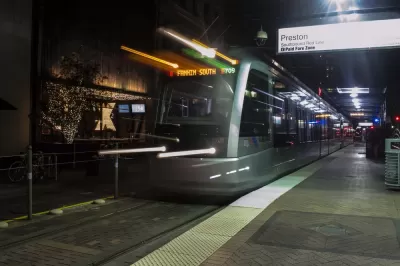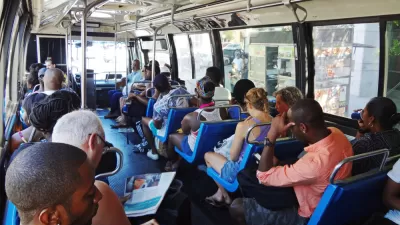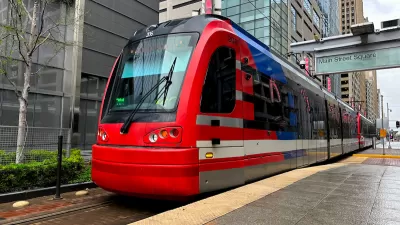A review of board members' Q Cards reveals the extent to which the people who implement Houston's transit policy actually use the system: some quite a bit, some not so much.

Following Houston voters' approval of a $3.5 billion transit bond measure, "riders have said it is critical leaders know what sort of improvements need to be built. The best way to do that, some say, is for [Metro] board members to experience it," Dug Begley writes.
But a Houston Chronicle review of Metropolitan Transit Authority board members' agency-issued Q cards reveals that some of the folks in charge aren't regular transit riders. The review "shows three Metro board members did not ride a single bus or train between Jan. 1, 2018, and Aug. 31, 2019. Other members were mixed, with some taking a handful of trips while others with different commuting locations and habits hop aboard frequently."
Sanjay Ramabhadran, one of the board members who logged the most trips, said that using the system is "an important determinant—but not the only one—board members should use" in making decisions, Begley reports. "We all bring different strengths to the board," Ramabhadran said. "Some of them might be riding the system, some of that might be financial or engineering."
Begley's write-up gives some background on each of Houston Metro's board members and outlines how often they use the system, as well as which parts of the system they tend to frequent.
FULL STORY: Metro board members will set course of $7.5B transit plan, but not all ride

Planetizen Federal Action Tracker
A weekly monitor of how Trump’s orders and actions are impacting planners and planning in America.

Congressman Proposes Bill to Rename DC Metro “Trump Train”
The Make Autorail Great Again Act would withhold federal funding to the system until the Washington Metropolitan Area Transit Authority (WMATA), rebrands as the Washington Metropolitan Authority for Greater Access (WMAGA).

The Simple Legislative Tool Transforming Vacant Downtowns
In California, Michigan and Georgia, an easy win is bringing dollars — and delight — back to city centers.

The States Losing Rural Delivery Rooms at an Alarming Pace
In some states, as few as 9% of rural hospitals still deliver babies. As a result, rising pre-term births, no adequate pre-term care and "harrowing" close calls are a growing reality.

The Small South Asian Republic Going all in on EVs
Thanks to one simple policy change less than five years ago, 65% of new cars in this Himalayan country are now electric.

DC Backpedals on Bike Lane Protection, Swaps Barriers for Paint
Citing aesthetic concerns, the city is removing the concrete barriers and flexposts that once separated Arizona Avenue cyclists from motor vehicles.
Urban Design for Planners 1: Software Tools
This six-course series explores essential urban design concepts using open source software and equips planners with the tools they need to participate fully in the urban design process.
Planning for Universal Design
Learn the tools for implementing Universal Design in planning regulations.
Smith Gee Studio
City of Charlotte
City of Camden Redevelopment Agency
City of Astoria
Transportation Research & Education Center (TREC) at Portland State University
US High Speed Rail Association
City of Camden Redevelopment Agency
Municipality of Princeton (NJ)





























